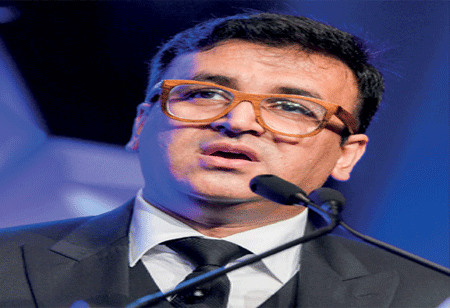Dr. Kanav Kahol, CEO, DIVOC Health & Pink Tech Design | Monday, 19 September 2022

Healthcare is one of the fast¬est growing sectors in India and it is relatively offering a lower priced treatment options that provide a great opportunity for the growth of various segments across the industry – medical devices, pharmaceutical manufacturers and healthcare providers. COVID pandemic has put technol¬ogy front and centre as relating to healthcare. They say in healthcare it takes a generation for a technolo¬gy to be adopted. This was certainly true in the past but now with a rap¬idly changing world, use of technolo¬gies has become critical to delivering quality healthcare. At one end lies using telemedicine to enable care and at the other end we have use of AI to help in drug discovery. The field of medical informatics has been leading the charge for the past few years in slowly assimilating technology into healthcare.
Time has come to acceler¬ate these efforts. According to a PwC report - rein¬carnating the possibility in the Indian healthcare ecosystem with emerging technologies, the Indian healthcare sector has made substantial prog¬ress, especially in the last decade. Between 2000 and 2014, there was a 370 percent hike in health expenditure from the government in its strive to improve public health delivery. More¬over, the Union Budget 2018 allocated Rs. 3,073 crore for creating a digital economy with emerging technologies like Internet of Things (IoT), Artificial Intelligence (AI), Blockchain and 3D printing, to build a modern technolo¬gy outlook in healthcare delivery and improve productivity and efficiency by minimising human intervention in electronic medical records(EMRs)/ hospital information systems (HISs)/ enterprise resource planning (ERP).
Our governments digitization plan explicitly includes healthcare and with Ayushman Bharat technology is needed to ensure equitable access and prevent fraudulent billing. Compa¬nies such as PinkTech Design and Nu¬verse are developing AI and IOT based tools for Ayushman Bharat. This just shows that we are at the beginning of acceleration of healthtech revolution.
Digital Innovation and Transformation Major advances in wireless technol¬ogy and computing power are driv¬ing the pace of digital health care innovations and are impacting both clinical and business operations. Machine learning, robotic process automation (RPA), Artificial Intelli¬gence (AI) predictive tools and cloud-based software-as-a-service (SaaS) are being leveraged heavily to im¬prove the healthcare infrastructure. Additionally, better data access and data sharing are improving self-ser¬vice, personalisation, diagnosis and patient experience.
The scope of tech¬nological advancements in health¬care is wider than we can imagine, for instance, Blockchain has the po¬tential to enhance trust, collabora-tion and traceability across a range of segments such as supply chain management, clinical trials, financial transactions and claims processing. It is evident that technology is revolutionising the healthcare system in India. Several cutting-edge and ide¬ating, pilot programmes around tele¬medicine, mobile health (m-health), and the Internet of Medical Things (IoMT) have been making advance¬ments in the Indian healthcare eco¬system.
Over the last few years, many hospitals both public and private have moved to online patient regis¬tration and service delivery systems, and mobile apps for online payment, appointment booking, test reports and analytics, sharing health tips, and more Moreover, the advanced tools and technologies are transforming the industry with the use of data and personalised member outreach and engagement.
Technologies like tele¬medicine are helping bring patients and doctors together, bridging the care access divide. According to the Global Telemedicine Market Anal¬ysis the global telemedicine mar¬ket is expected to grow at a CAGR of 17.85 percent, reaching $80.61 billion by 2024. Many healthcare institutions are leveraging social methods to improve communication and collaboration between doctors and patients and also, patients themselves. This is helping in creating self-service based community support groups for various diseases.
Why Technology Integration is Import¬ant? Technology is the most efficient way to achieve the vision of a connect¬ed healthcare ecosystem. The latest technological advancements can fa¬cilitate the healthcare industry in adopting disruptive technology led service and business models, enhance accessibility and affordability, and move towards making India a global healthcare hub. Mobile care applications, tele¬medicine, medical devices in hospi¬tals/clinics, wearables and sensors are all different forms of technology that are dramatically transforming this ecosystem.
These tools provision the healthcare service providers to perform their roles more easily, fast¬er and efficiently by automating the logging-on mechanism, real-time up¬dates of patient vitals and providing insights into early detection of diseas¬es. Additionally, technologies help to collect, safely store and share critical patient data. With the help of analyt¬ics, caregivers are able to provide a much better analysis of the condition and recommendations to the patient.
Leveraging Technology for Powerful Insights The purpose is to empower healthcare providers with the tools and tech¬niques to deliver better care or elim¬inate current challenges. For example AR and VR, in addition to holograms are being used by surgeons for precise surgeries with the help of 3D models of the patient which can be analysed in detail before performing the actual complex surgery. The system is experimenting with technologies that could think, sense, and act like humans. For example, aspects like NLP are being used to structure the unstructured data en¬tered by clinicians in e-prescriptions. Other key measures include piloting speech to text technology for enabling accurate capture of clinical informa¬tion in systems, point of care diagnos¬tics in smart ambulances, transfer of vital patient information from point of care to the command center to provide timely assistance to patients in transit.
AR is increasingly being used in medical education, especially to re¬duce the count of actual dissections, and to study human anatomy, em¬bryology and histology better. As the focus of healthcare is shifting to personalised care,the adoption of AI assistants and chatbots could help in reducing the workload of doc¬tors and ensuring better service and convenience for patients, in addition to helping them with 24x7 support.
The industry needs to leverage the opportunities that digital technologies bring to them and build a structured approach to digital transformation